Unit 8 Have you read Treasure Island yet? Section B 讲义(含答案)
文档属性
| 名称 | Unit 8 Have you read Treasure Island yet? Section B 讲义(含答案) |
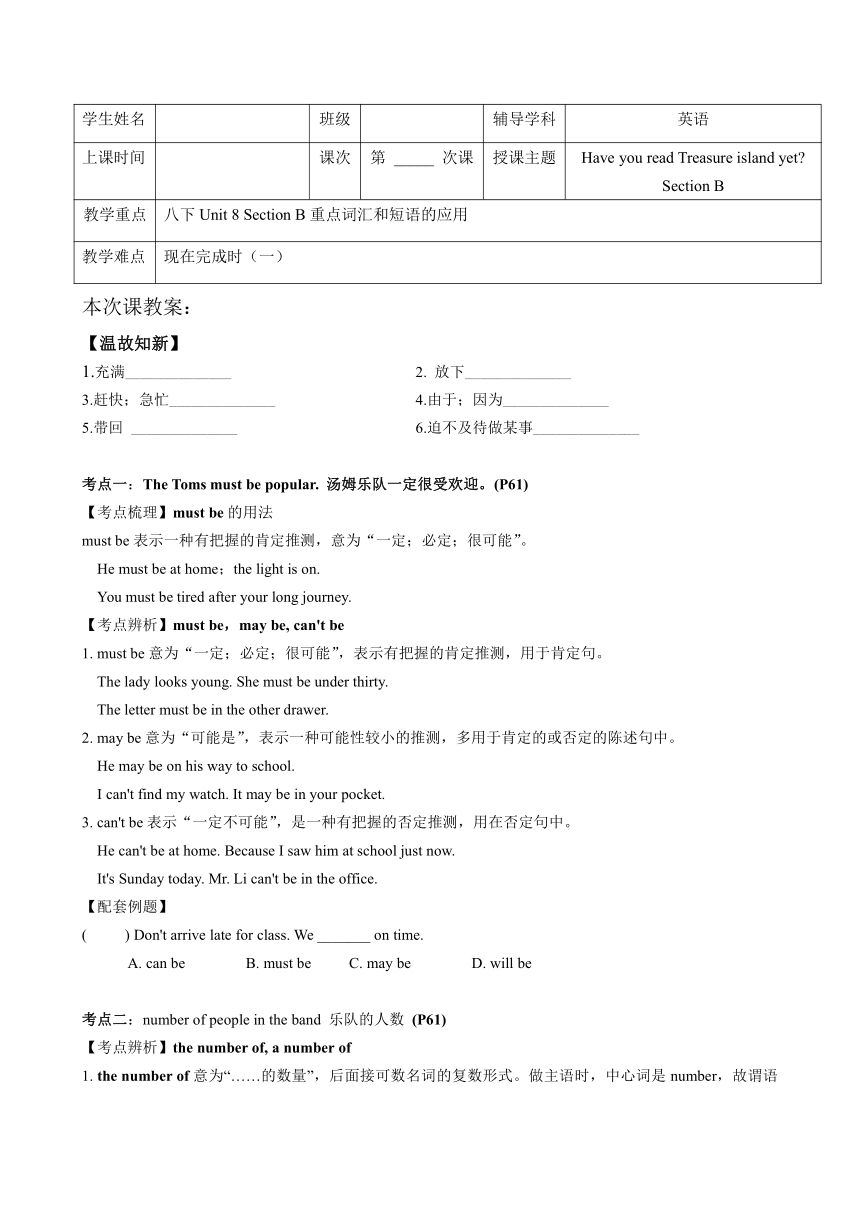
|
|
| 格式 | docx | ||
| 文件大小 | 140.1KB | ||
| 资源类型 | 教案 | ||
| 版本资源 | 人教新目标(Go for it)版 | ||
| 科目 | 英语 | ||
| 更新时间 | 2021-04-12 00:00:00 | ||
图片预览

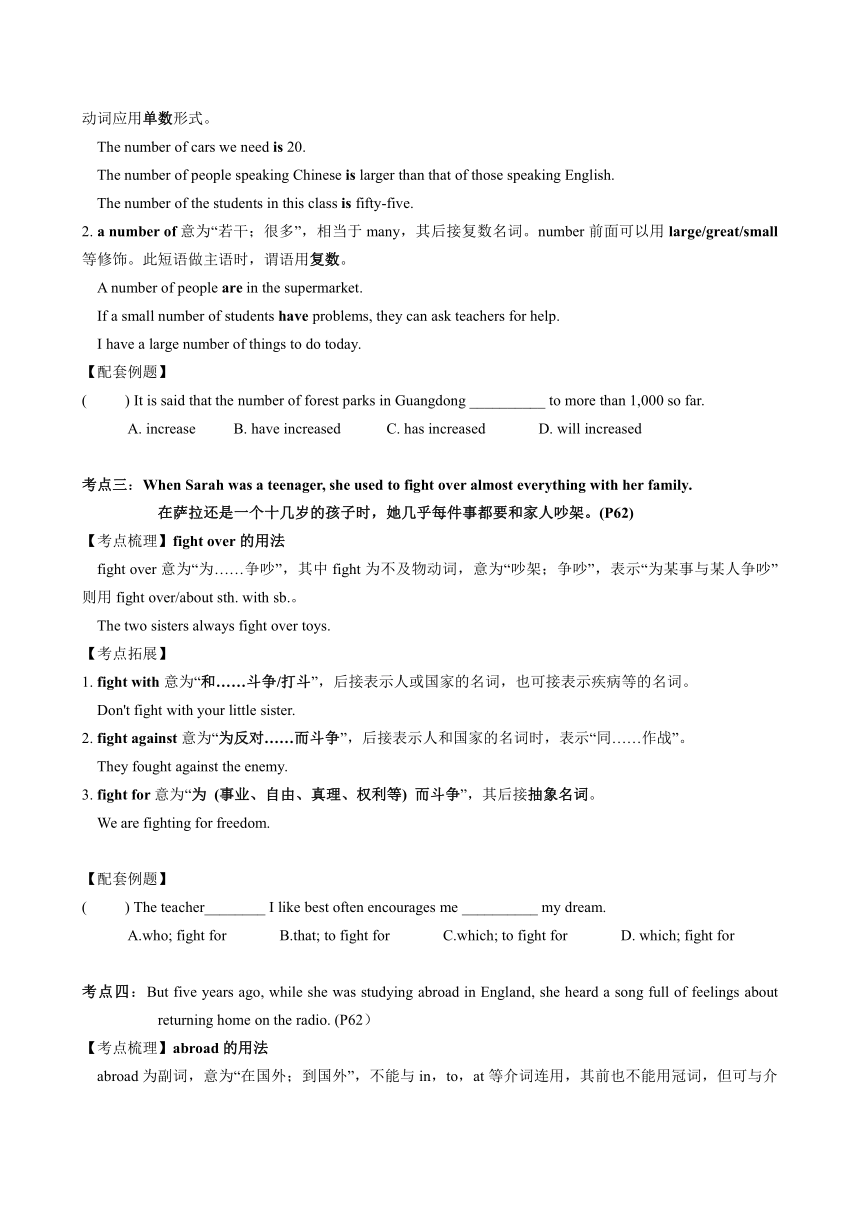
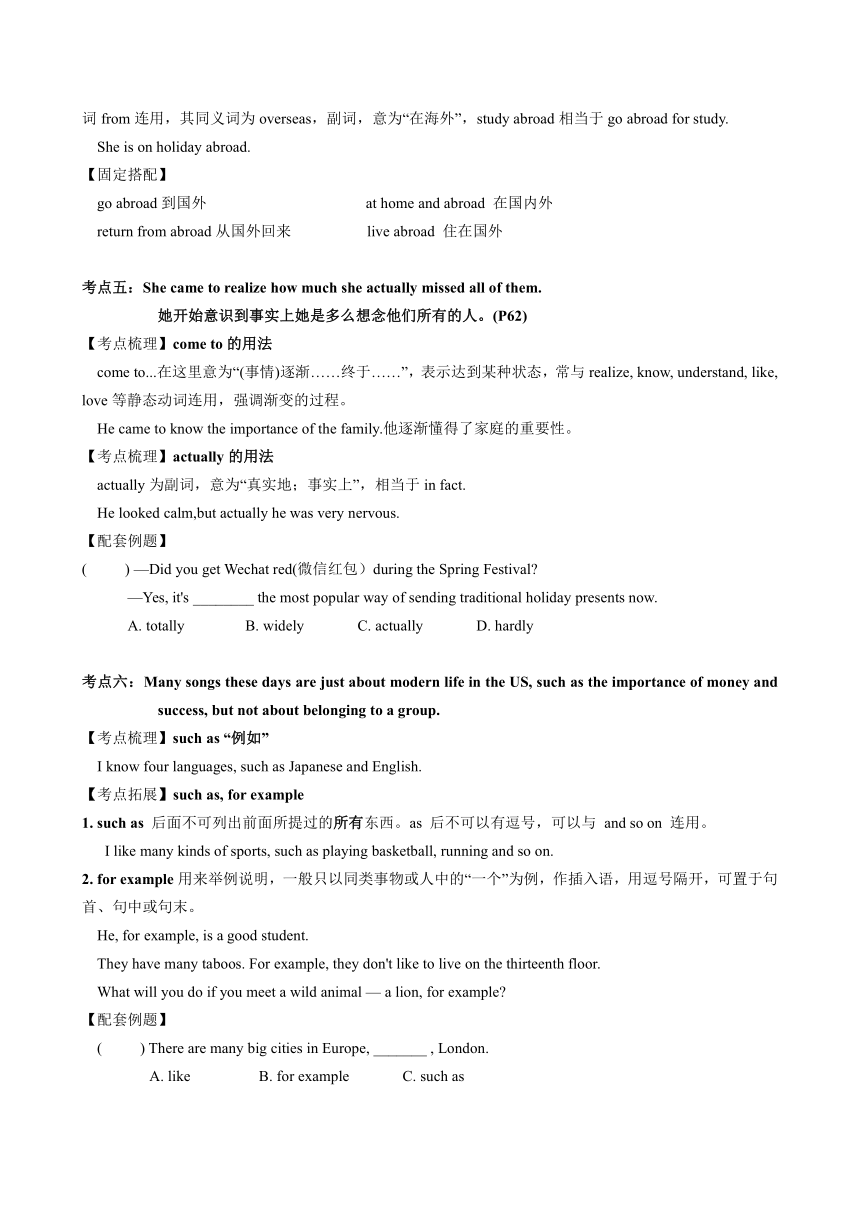
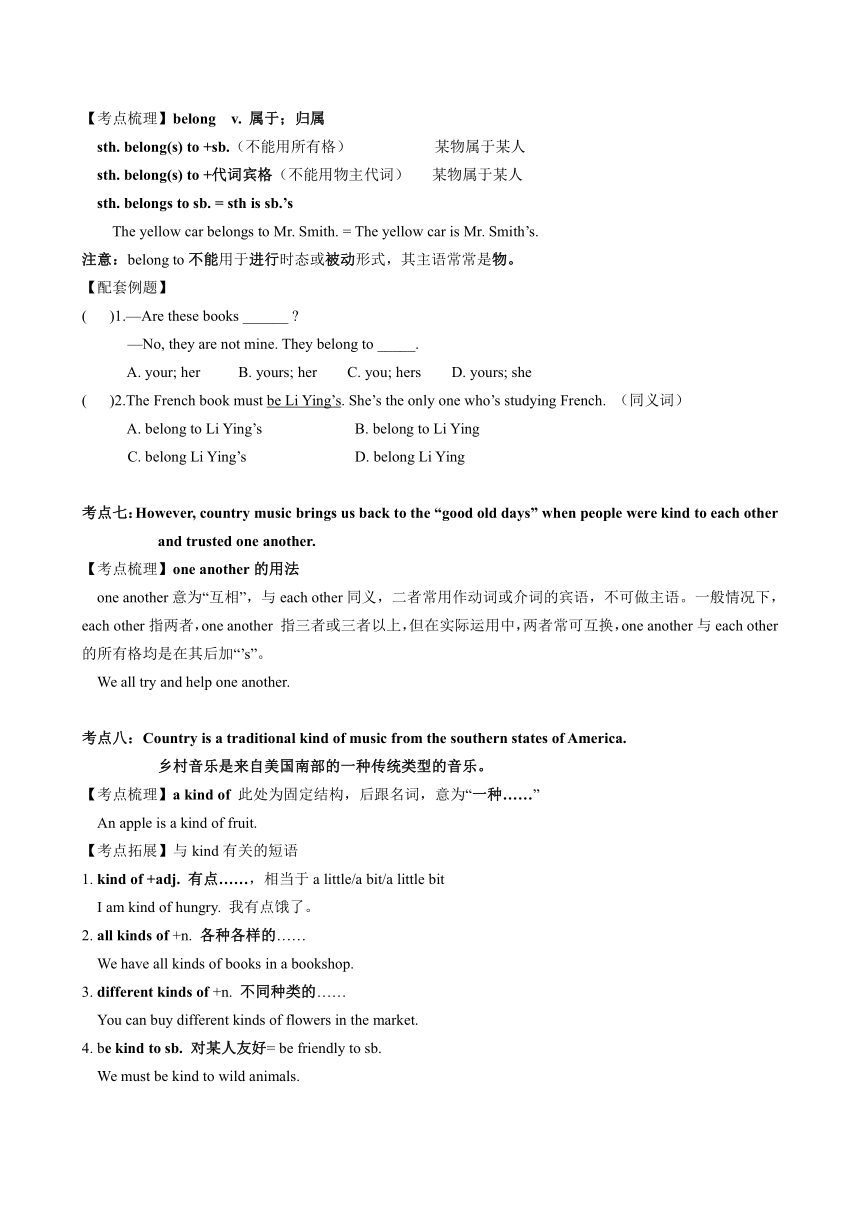
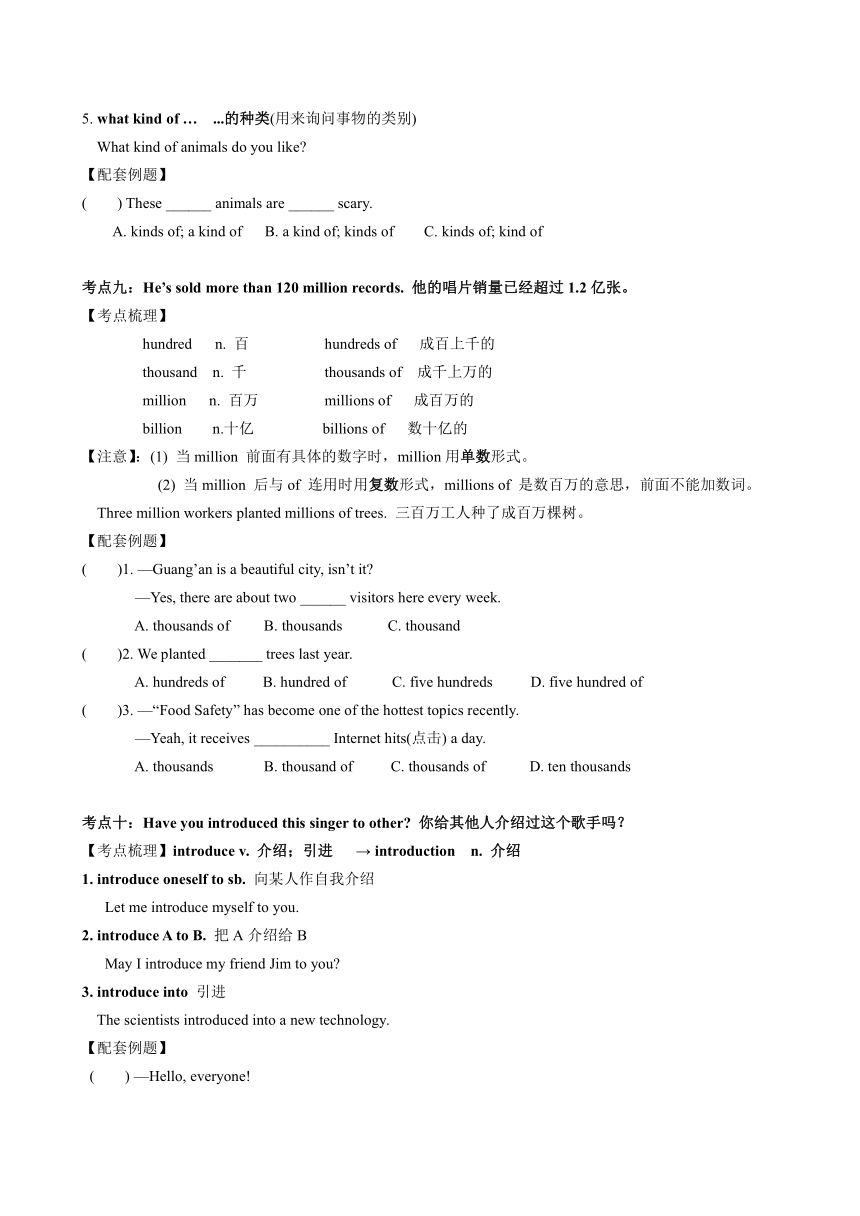
文档简介
学生姓名
班级
辅导学科
英语
上课时间
课次
第 _____ 次课
授课主题
Have you read Treasure island yet?
Section B
教学重点
八下Unit 8 Section B重点词汇和短语的应用
教学难点
现在完成时(一)
本次课教案:
【温故知新】
1.充满______________ 2. 放下______________
3.赶快;急忙______________ 4.由于;因为______________
5.带回 ______________ 6.迫不及待做某事______________
考点一:The Toms must be popular. 汤姆乐队一定很受欢迎。(P61)
【考点梳理】must be的用法
must be表示一种有把握的肯定推测,意为“一定;必定;很可能”。
He must be at home;the light is on.
You must be tired after your long journey.
【考点辨析】must be,may be, can't be
1. must be意为“一定;必定;很可能”,表示有把握的肯定推测,用于肯定句。
The lady looks young. She must be under thirty.
The letter must be in the other drawer.
2. may be意为“可能是”,表示一种可能性较小的推测,多用于肯定的或否定的陈述句中。
He may be on his way to school.
I can't find my watch. It may be in your pocket.
3. can't be表示“一定不可能”,是一种有把握的否定推测,用在否定句中。
He can't be at home. Because I saw him at school just now.
It's Sunday today. Mr. Li can't be in the office.
【配套例题】
( ) Don't arrive late for class. We _______ on time.
A. can be B. must be C. may be D. will be
考点二:number of people in the band 乐队的人数 (P61)
【考点辨析】the number of, a number of
1. the number of意为“……的数量”,后面接可数名词的复数形式。做主语时,中心词是number,故谓语动词应用单数形式。
The number of cars we need is 20.
The number of people speaking Chinese is larger than that of those speaking English.
The number of the students in this class is fifty-five.
2. a number of意为“若干;很多”,相当于many,其后接复数名词。number前面可以用large/great/small等修饰。此短语做主语时,谓语用复数。
A number of people are in the supermarket.
If a small number of students have problems, they can ask teachers for help.
I have a large number of things to do today.
【配套例题】
( ) It is said that the number of forest parks in Guangdong __________ to more than 1,000 so far.
A. increase B. have increased C. has increased D. will increased
考点三:When Sarah was a teenager, she used to fight over almost everything with her family.
在萨拉还是一个十几岁的孩子时,她几乎每件事都要和家人吵架。(P62)
【考点梳理】fight over的用法
fight over意为“为……争吵”,其中fight为不及物动词,意为“吵架;争吵”,表示“为某事与某人争吵”则用fight over/about sth. with sb.。
The two sisters always fight over toys.
【考点拓展】
1. fight with意为“和……斗争/打斗”,后接表示人或国家的名词,也可接表示疾病等的名词。
Don't fight with your little sister.
2. fight against意为“为反对……而斗争”,后接表示人和国家的名词时,表示“同……作战”。
They fought against the enemy.
3. fight for意为“为 (事业、自由、真理、权利等) 而斗争”,其后接抽象名词。
We are fighting for freedom.
【配套例题】
( ) The teacher________ I like best often encourages me __________ my dream.
A.who; fight for B.that; to fight for C.which; to fight for D. which; fight for
考点四:But five years ago, while she was studying abroad in England, she heard a song full of feelings about returning home on the radio. (P62)
【考点梳理】abroad的用法
abroad为副词,意为“在国外;到国外”,不能与in,to,at等介词连用,其前也不能用冠词,但可与介词from连用,其同义词为overseas,副词,意为“在海外”,study abroad相当于go abroad for study.
She is on holiday abroad.
【固定搭配】
go abroad到国外 at home and abroad 在国内外
return from abroad从国外回来 live abroad 住在国外
考点五:She came to realize how much she actually missed all of them.
她开始意识到事实上她是多么想念他们所有的人。(P62)
【考点梳理】come to的用法
come to...在这里意为“(事情)逐渐……终于……”,表示达到某种状态,常与realize, know, understand, like, love等静态动词连用,强调渐变的过程。
He came to know the importance of the family.他逐渐懂得了家庭的重要性。
【考点梳理】actually的用法
actually为副词,意为“真实地;事实上”,相当于in fact.
He looked calm,but actually he was very nervous.
【配套例题】
( ) —Did you get Wechat red(微信红包)during the Spring Festival?
—Yes, it's ________ the most popular way of sending traditional holiday presents now.
A. totally B. widely C. actually D. hardly
考点六:Many songs these days are just about modern life in the US, such as the importance of money and success, but not about belonging to a group.
【考点梳理】such as “例如”
I know four languages, such as Japanese and English.
【考点拓展】such as, for example
1. such as 后面不可列出前面所提过的所有东西。as 后不可以有逗号,可以与 and so on 连用。
I like many kinds of sports, such as playing basketball, running and so on.
2. for example用来举例说明,一般只以同类事物或人中的“一个”为例,作插入语,用逗号隔开,可置于句首、句中或句末。
He, for example, is a good student.
They have many taboos. For?example,?they?don't?like?to?live?on?the thirteenth?floor.
What will you do if you meet a wild animal — a lion, for example?
【配套例题】
( ) There are many big cities in Europe, _______ , London.
A. like B. for example C. such as
【考点梳理】belong v. 属于;归属
sth. belong(s) to +sb.(不能用所有格) 某物属于某人
sth. belong(s) to +代词宾格(不能用物主代词) 某物属于某人
sth. belongs to sb. = sth is sb.’s
The yellow car belongs to Mr. Smith. = The yellow car is Mr. Smith’s.
注意:belong to不能用于进行时态或被动形式,其主语常常是物。
【配套例题】
( )1.—Are these books ______ ?
—No, they are not mine. They belong to _____.
A. your; her B. yours; her C. you; hers D. yours; she
( )2.The French book must be Li Ying’s. She’s the only one who’s studying French. (同义词)
A. belong to Li Ying’s B. belong to Li Ying
C. belong Li Ying’s D. belong Li Ying
考点七:However, country music brings us back to the “good old days” when people were kind to each other and trusted one another.
【考点梳理】one another的用法
one another意为“互相”,与each other同义,二者常用作动词或介词的宾语,不可做主语。一般情况下,each other指两者,one another 指三者或三者以上,但在实际运用中,两者常可互换,one another与each other的所有格均是在其后加“’s”。
We all try and help one another.
考点八:Country is a traditional kind of music from the southern states of America.
乡村音乐是来自美国南部的一种传统类型的音乐。
【考点梳理】a kind of 此处为固定结构,后跟名词,意为“一种……”
An apple is a kind of fruit.
【考点拓展】与kind有关的短语
1. kind of +adj. 有点……,相当于a little/a bit/a little bit
I am kind of hungry. 我有点饿了。
2. all kinds of +n. 各种各样的……
We have all kinds of books in a bookshop.
3. different kinds of +n. 不同种类的……
You can buy different kinds of flowers in the market.
4. be kind to sb. 对某人友好= be friendly to sb.
We must be kind to wild animals.
5. what kind of … ...的种类(用来询问事物的类别)
What kind of animals do you like?
【配套例题】
( ) These ______ animals are ______ scary.
A. kinds of; a kind of B. a kind of; kinds of C. kinds of; kind of
考点九:He’s sold more than 120 million records. 他的唱片销量已经超过1.2亿张。
【考点梳理】
hundred n. 百 hundreds of 成百上千的
thousand n. 千 thousands of 成千上万的
million n. 百万 millions of 成百万的
billion n.十亿 billions of 数十亿的
【注意】:(1) 当million 前面有具体的数字时,million用单数形式。
(2) 当million 后与of 连用时用复数形式,millions of 是数百万的意思,前面不能加数词。
Three million workers planted millions of trees. 三百万工人种了成百万棵树。
【配套例题】
( )1. —Guang’an is a beautiful city, isn’t it?
—Yes, there are about two ______ visitors here every week.
A. thousands of B. thousands C. thousand
( )2. We planted _______ trees last year.
A. hundreds of B. hundred of C. five hundreds D. five hundred of
( )3. —“Food Safety” has become one of the hottest topics recently.
—Yeah, it receives __________ Internet hits(点击) a day.
A. thousands B. thousand of C. thousands of D. ten thousands
考点十:Have you introduced this singer to other? 你给其他人介绍过这个歌手吗?
【考点梳理】introduce v. 介绍;引进 → introduction n. 介绍
1. introduce oneself to sb. 向某人作自我介绍
Let me introduce myself to you.
2. introduce A to B. 把A介绍给B
May I introduce my friend Jim to you?
3. introduce into 引进
The scientists introduced into a new technology.
【配套例题】
( ) —Hello, everyone!
—Please let me ______.
A. introduce my name B. introduce myself
C. to introduce myself D. introduce to myself
大显身手
( )1. —________ yourself to us, please.
—OK. I'm Sarah and I'm from Canada.
A. Introduce B. Mark C. Record D. Enjoy
( )2. We all want to know what ________ happened.
A. hardly B. real C. actually D. near
( )3. The twin sisters always________toys.
A. fight over B. fight for C. fight against D. fight with
( )4. —I saw Mr. White in his office just now.
—No, it ________ be him. He has ________ Beijing and will come back next Friday.
A. mustn't; gone to B. mustn't; been to C. can't; been to D. can't; gone to
( )5. The environment here becomes better and better. ________ birds are coming back.
A. Thousands of B. Thousand of C. Thousands D. Thousand
重点语法--现在完成时(一)
一、现在完成时的用法
表示一个过去发生并已完成的动作对现在产生影响或结果,强调的是现在的状况(表示“已完成”)。
He has left the city. (结果:他目前不在这个城市)
Someone has broken the window. (结果:窗户破了)
表示一个动作开始于过去,持续到现在,也可能还会继续持续下去(表示“未完成”)。
I have been busy since last week.
He has taught in our school for 30 years.
I’ve finished half so far.
二、现在完成时的构成
have / has + 动词的过去分词: 规则动词的过去分词构成与过去式相同;不规则变化需要熟读记忆。
动词过去式的变化规则
变形方法
例词
一般情况
+ed
work—worked
不发音e结尾
+d
live—lived
辅音字母+y结尾
变y为i+ed
carry—carried; study—studied; supply—supplied
重读闭音节结尾且结尾只有一个辅音字母
双写最后的辅音字母+ed
plan—planned; stop—stopped
prefer—preferred; regret—regretted
特殊情况
不规则
三、现在完成时的标志词
能与现在完成时连用的词语很多,just, already, yet, before, never, ever, recently等,常见的有:
1. since +“一段时间+ago”、过去时间点、过去时的从句:“自从...”
I have taught him English since three years ago.
I have taught him English since 2017.
Nicole has lived here since she was a child.
2. for+一段时间
I have taught him English for three years.
Nicole has lived here for 15 years.
【配套例题】用since或for填空
(1)Jim has been in Ireland ______ Monday.
(2)Jim has been in Ireland ______ three days.
(3)His aunt has lived in Australia ______15 days.
(4)Mary is in her office. She has been there ______ 7 o'clock.
(5)India has been an independent country ______1974.
3. already 用于肯定句中“已经”; ye用于否定句末“还(没)”和疑问句末“已经”。
We have already cleaned the classroom.
—Has he found his watch yet?
—No, not yet.
already与yet互换:把含有already的陈述句变为否定句或疑问句时,把already改为yet,并放于句末。
4. in / during the past/last … years 在过去/最近…中
Great changes have taken place in the last ten years.
I have been here (for) the last/past month.
5. so far 到目前为止
We haven’t had any trouble so far.
So far the search for the missing middle-aged woman has been fruitless.
6. up to/until now 到现在为止
Up to now he’s been quiet.
Up to now, the work has been easy.
I have heard nothing from him up till now.
Up till now we have planted over 2000 trees.
四、现在完成时的句型转换
五、现在完成时与一般过去时的区别
1.侧重点不同:现在完成时强调过去对现在造成的影响; 一般过去时强调过去发生的事或状态,与现在无关。
I have seen this film. (我已经看过了这部电影)
I saw this film yesterday. (我是昨天看的这部电影)
2.时间状语不同:现在完成时通常与以下时间状语连用:since, already, yet, before, never, ever, recently等;
一般过去时通常与表示过去的具体时间连用:(如yesterday, last night, …ago, just now)
Tim has worked in this company since 2 months ago.
Tim worked in this company 2 months ago.
【小试牛刀】
( )1.—What did you do last night?
—I _________TV and read books.
A. watch B. watched C. have watched
( )2.—Look at these stamps. I _____ them for five years.
—Wow, they are wonderful.
A. kept B. have kept C. have bought
( )3.—Do you know who took the students to the old people’s home, Tony?
—Well, Mr. Smith _______.
A. took B. does C. did D. do
( )4.—We all went to the cinema except you last night. Why didn't you come?
—Because I ______ that movie twice.
A. have watched B. had watched C. was watching D. would watch
( )5.Sally took a photo of her friends while they _________ computer games.
A. play B. are playing C. have played D. were playing
( )16.It will be hard for us to get up in the morning if we ____to bed too late.
A. go B. went C. will go D. have gone
( )7.—Jack, let’s go to see the movie Harry Potter.
—Oh, I ______ it many times. So I don’t want to see it.
A. have seen B. see C. will see
( )8.—Why don’t you go to the movie with me, Betty?
—Because I ______ it before.
A. saw B. have seen C. see
Homework
一、综合填空
用括号内所给词的适当形式填空。
The book I read is A Picture to Remember by Sarah Scott-Malden. It's about a girl ________ 1(call) Christina. One day, when she was waiting at the traffic lights, she ________ 2 (notice) two men with a gun in a car next to her. They were bank robbers (抢劫者) and she saw ________ 3(they) faces, so they planned to kill her.
At first, one of the robbers affected(攻击) Christina near the park, but ________4(luck) she only got her arm hurt slightly. After she called her friend, Philippe for help, they were ________5 (hurry) in the street when the robbers drove their car into them. Philippe was ________ 6(hurt) seriously and had _______7(go) to hospital. When Christina visited Philippe and ________ 8 (leave) the hospital, the robbers followed her. Christina saw that they had a gun and understood what they wanted ________ 9 (do). She was scared, but she kept calm. The robbers were still behind her, but they ________ 10(be) driving so fast that they couldn't stop the car and it turned over, so the police caught both of the robbers. That's the end of the story.
二、词汇运用
11 The fashion show(时装秀) held by UNICEF last week was a big ________(successful).
12. We shall never forget the ________ (beautiful) of the West Lake in Hangzhou.
13. —Whose house is this?
—It ________ (属于)to my grandfather.
14 What ________(其他的) do you like?
15. A girl came across the garden ________(朝着) them.
每日记背
一、短语归纳
1. fight over sth. 为……而争吵 2. such as 例如
3. bring back 带回 4. study abroad 出国留学
5. trust one another 相互信任 6. put down 放下
7. keep on eating 继续吃饭 8. at the end of the day 一天结束
二、句型集萃
1.can’t wait to do sth. 迫不及待做某事 2.be kind to sb. 对某人友好
3.hope to do sth. 希望做某事
答案
温故知新
1. be full of 2.put down 3.hurry up 4.due to 5.bring back 6.can't wait to do sth.
大显身手
ACADA
重点语法
BBCAD AAB
HOMEWORK
1. called 2. noticed 3. their 4. luckily 5. hurrying
6. hurt 7. to go 8. left 9. to do 10. were
11. success 12. beauty 13. belongs 14. else 15. towards
班级
辅导学科
英语
上课时间
课次
第 _____ 次课
授课主题
Have you read Treasure island yet?
Section B
教学重点
八下Unit 8 Section B重点词汇和短语的应用
教学难点
现在完成时(一)
本次课教案:
【温故知新】
1.充满______________ 2. 放下______________
3.赶快;急忙______________ 4.由于;因为______________
5.带回 ______________ 6.迫不及待做某事______________
考点一:The Toms must be popular. 汤姆乐队一定很受欢迎。(P61)
【考点梳理】must be的用法
must be表示一种有把握的肯定推测,意为“一定;必定;很可能”。
He must be at home;the light is on.
You must be tired after your long journey.
【考点辨析】must be,may be, can't be
1. must be意为“一定;必定;很可能”,表示有把握的肯定推测,用于肯定句。
The lady looks young. She must be under thirty.
The letter must be in the other drawer.
2. may be意为“可能是”,表示一种可能性较小的推测,多用于肯定的或否定的陈述句中。
He may be on his way to school.
I can't find my watch. It may be in your pocket.
3. can't be表示“一定不可能”,是一种有把握的否定推测,用在否定句中。
He can't be at home. Because I saw him at school just now.
It's Sunday today. Mr. Li can't be in the office.
【配套例题】
( ) Don't arrive late for class. We _______ on time.
A. can be B. must be C. may be D. will be
考点二:number of people in the band 乐队的人数 (P61)
【考点辨析】the number of, a number of
1. the number of意为“……的数量”,后面接可数名词的复数形式。做主语时,中心词是number,故谓语动词应用单数形式。
The number of cars we need is 20.
The number of people speaking Chinese is larger than that of those speaking English.
The number of the students in this class is fifty-five.
2. a number of意为“若干;很多”,相当于many,其后接复数名词。number前面可以用large/great/small等修饰。此短语做主语时,谓语用复数。
A number of people are in the supermarket.
If a small number of students have problems, they can ask teachers for help.
I have a large number of things to do today.
【配套例题】
( ) It is said that the number of forest parks in Guangdong __________ to more than 1,000 so far.
A. increase B. have increased C. has increased D. will increased
考点三:When Sarah was a teenager, she used to fight over almost everything with her family.
在萨拉还是一个十几岁的孩子时,她几乎每件事都要和家人吵架。(P62)
【考点梳理】fight over的用法
fight over意为“为……争吵”,其中fight为不及物动词,意为“吵架;争吵”,表示“为某事与某人争吵”则用fight over/about sth. with sb.。
The two sisters always fight over toys.
【考点拓展】
1. fight with意为“和……斗争/打斗”,后接表示人或国家的名词,也可接表示疾病等的名词。
Don't fight with your little sister.
2. fight against意为“为反对……而斗争”,后接表示人和国家的名词时,表示“同……作战”。
They fought against the enemy.
3. fight for意为“为 (事业、自由、真理、权利等) 而斗争”,其后接抽象名词。
We are fighting for freedom.
【配套例题】
( ) The teacher________ I like best often encourages me __________ my dream.
A.who; fight for B.that; to fight for C.which; to fight for D. which; fight for
考点四:But five years ago, while she was studying abroad in England, she heard a song full of feelings about returning home on the radio. (P62)
【考点梳理】abroad的用法
abroad为副词,意为“在国外;到国外”,不能与in,to,at等介词连用,其前也不能用冠词,但可与介词from连用,其同义词为overseas,副词,意为“在海外”,study abroad相当于go abroad for study.
She is on holiday abroad.
【固定搭配】
go abroad到国外 at home and abroad 在国内外
return from abroad从国外回来 live abroad 住在国外
考点五:She came to realize how much she actually missed all of them.
她开始意识到事实上她是多么想念他们所有的人。(P62)
【考点梳理】come to的用法
come to...在这里意为“(事情)逐渐……终于……”,表示达到某种状态,常与realize, know, understand, like, love等静态动词连用,强调渐变的过程。
He came to know the importance of the family.他逐渐懂得了家庭的重要性。
【考点梳理】actually的用法
actually为副词,意为“真实地;事实上”,相当于in fact.
He looked calm,but actually he was very nervous.
【配套例题】
( ) —Did you get Wechat red(微信红包)during the Spring Festival?
—Yes, it's ________ the most popular way of sending traditional holiday presents now.
A. totally B. widely C. actually D. hardly
考点六:Many songs these days are just about modern life in the US, such as the importance of money and success, but not about belonging to a group.
【考点梳理】such as “例如”
I know four languages, such as Japanese and English.
【考点拓展】such as, for example
1. such as 后面不可列出前面所提过的所有东西。as 后不可以有逗号,可以与 and so on 连用。
I like many kinds of sports, such as playing basketball, running and so on.
2. for example用来举例说明,一般只以同类事物或人中的“一个”为例,作插入语,用逗号隔开,可置于句首、句中或句末。
He, for example, is a good student.
They have many taboos. For?example,?they?don't?like?to?live?on?the thirteenth?floor.
What will you do if you meet a wild animal — a lion, for example?
【配套例题】
( ) There are many big cities in Europe, _______ , London.
A. like B. for example C. such as
【考点梳理】belong v. 属于;归属
sth. belong(s) to +sb.(不能用所有格) 某物属于某人
sth. belong(s) to +代词宾格(不能用物主代词) 某物属于某人
sth. belongs to sb. = sth is sb.’s
The yellow car belongs to Mr. Smith. = The yellow car is Mr. Smith’s.
注意:belong to不能用于进行时态或被动形式,其主语常常是物。
【配套例题】
( )1.—Are these books ______ ?
—No, they are not mine. They belong to _____.
A. your; her B. yours; her C. you; hers D. yours; she
( )2.The French book must be Li Ying’s. She’s the only one who’s studying French. (同义词)
A. belong to Li Ying’s B. belong to Li Ying
C. belong Li Ying’s D. belong Li Ying
考点七:However, country music brings us back to the “good old days” when people were kind to each other and trusted one another.
【考点梳理】one another的用法
one another意为“互相”,与each other同义,二者常用作动词或介词的宾语,不可做主语。一般情况下,each other指两者,one another 指三者或三者以上,但在实际运用中,两者常可互换,one another与each other的所有格均是在其后加“’s”。
We all try and help one another.
考点八:Country is a traditional kind of music from the southern states of America.
乡村音乐是来自美国南部的一种传统类型的音乐。
【考点梳理】a kind of 此处为固定结构,后跟名词,意为“一种……”
An apple is a kind of fruit.
【考点拓展】与kind有关的短语
1. kind of +adj. 有点……,相当于a little/a bit/a little bit
I am kind of hungry. 我有点饿了。
2. all kinds of +n. 各种各样的……
We have all kinds of books in a bookshop.
3. different kinds of +n. 不同种类的……
You can buy different kinds of flowers in the market.
4. be kind to sb. 对某人友好= be friendly to sb.
We must be kind to wild animals.
5. what kind of … ...的种类(用来询问事物的类别)
What kind of animals do you like?
【配套例题】
( ) These ______ animals are ______ scary.
A. kinds of; a kind of B. a kind of; kinds of C. kinds of; kind of
考点九:He’s sold more than 120 million records. 他的唱片销量已经超过1.2亿张。
【考点梳理】
hundred n. 百 hundreds of 成百上千的
thousand n. 千 thousands of 成千上万的
million n. 百万 millions of 成百万的
billion n.十亿 billions of 数十亿的
【注意】:(1) 当million 前面有具体的数字时,million用单数形式。
(2) 当million 后与of 连用时用复数形式,millions of 是数百万的意思,前面不能加数词。
Three million workers planted millions of trees. 三百万工人种了成百万棵树。
【配套例题】
( )1. —Guang’an is a beautiful city, isn’t it?
—Yes, there are about two ______ visitors here every week.
A. thousands of B. thousands C. thousand
( )2. We planted _______ trees last year.
A. hundreds of B. hundred of C. five hundreds D. five hundred of
( )3. —“Food Safety” has become one of the hottest topics recently.
—Yeah, it receives __________ Internet hits(点击) a day.
A. thousands B. thousand of C. thousands of D. ten thousands
考点十:Have you introduced this singer to other? 你给其他人介绍过这个歌手吗?
【考点梳理】introduce v. 介绍;引进 → introduction n. 介绍
1. introduce oneself to sb. 向某人作自我介绍
Let me introduce myself to you.
2. introduce A to B. 把A介绍给B
May I introduce my friend Jim to you?
3. introduce into 引进
The scientists introduced into a new technology.
【配套例题】
( ) —Hello, everyone!
—Please let me ______.
A. introduce my name B. introduce myself
C. to introduce myself D. introduce to myself
大显身手
( )1. —________ yourself to us, please.
—OK. I'm Sarah and I'm from Canada.
A. Introduce B. Mark C. Record D. Enjoy
( )2. We all want to know what ________ happened.
A. hardly B. real C. actually D. near
( )3. The twin sisters always________toys.
A. fight over B. fight for C. fight against D. fight with
( )4. —I saw Mr. White in his office just now.
—No, it ________ be him. He has ________ Beijing and will come back next Friday.
A. mustn't; gone to B. mustn't; been to C. can't; been to D. can't; gone to
( )5. The environment here becomes better and better. ________ birds are coming back.
A. Thousands of B. Thousand of C. Thousands D. Thousand
重点语法--现在完成时(一)
一、现在完成时的用法
表示一个过去发生并已完成的动作对现在产生影响或结果,强调的是现在的状况(表示“已完成”)。
He has left the city. (结果:他目前不在这个城市)
Someone has broken the window. (结果:窗户破了)
表示一个动作开始于过去,持续到现在,也可能还会继续持续下去(表示“未完成”)。
I have been busy since last week.
He has taught in our school for 30 years.
I’ve finished half so far.
二、现在完成时的构成
have / has + 动词的过去分词: 规则动词的过去分词构成与过去式相同;不规则变化需要熟读记忆。
动词过去式的变化规则
变形方法
例词
一般情况
+ed
work—worked
不发音e结尾
+d
live—lived
辅音字母+y结尾
变y为i+ed
carry—carried; study—studied; supply—supplied
重读闭音节结尾且结尾只有一个辅音字母
双写最后的辅音字母+ed
plan—planned; stop—stopped
prefer—preferred; regret—regretted
特殊情况
不规则
三、现在完成时的标志词
能与现在完成时连用的词语很多,just, already, yet, before, never, ever, recently等,常见的有:
1. since +“一段时间+ago”、过去时间点、过去时的从句:“自从...”
I have taught him English since three years ago.
I have taught him English since 2017.
Nicole has lived here since she was a child.
2. for+一段时间
I have taught him English for three years.
Nicole has lived here for 15 years.
【配套例题】用since或for填空
(1)Jim has been in Ireland ______ Monday.
(2)Jim has been in Ireland ______ three days.
(3)His aunt has lived in Australia ______15 days.
(4)Mary is in her office. She has been there ______ 7 o'clock.
(5)India has been an independent country ______1974.
3. already 用于肯定句中“已经”; ye用于否定句末“还(没)”和疑问句末“已经”。
We have already cleaned the classroom.
—Has he found his watch yet?
—No, not yet.
already与yet互换:把含有already的陈述句变为否定句或疑问句时,把already改为yet,并放于句末。
4. in / during the past/last … years 在过去/最近…中
Great changes have taken place in the last ten years.
I have been here (for) the last/past month.
5. so far 到目前为止
We haven’t had any trouble so far.
So far the search for the missing middle-aged woman has been fruitless.
6. up to/until now 到现在为止
Up to now he’s been quiet.
Up to now, the work has been easy.
I have heard nothing from him up till now.
Up till now we have planted over 2000 trees.
四、现在完成时的句型转换
五、现在完成时与一般过去时的区别
1.侧重点不同:现在完成时强调过去对现在造成的影响; 一般过去时强调过去发生的事或状态,与现在无关。
I have seen this film. (我已经看过了这部电影)
I saw this film yesterday. (我是昨天看的这部电影)
2.时间状语不同:现在完成时通常与以下时间状语连用:since, already, yet, before, never, ever, recently等;
一般过去时通常与表示过去的具体时间连用:(如yesterday, last night, …ago, just now)
Tim has worked in this company since 2 months ago.
Tim worked in this company 2 months ago.
【小试牛刀】
( )1.—What did you do last night?
—I _________TV and read books.
A. watch B. watched C. have watched
( )2.—Look at these stamps. I _____ them for five years.
—Wow, they are wonderful.
A. kept B. have kept C. have bought
( )3.—Do you know who took the students to the old people’s home, Tony?
—Well, Mr. Smith _______.
A. took B. does C. did D. do
( )4.—We all went to the cinema except you last night. Why didn't you come?
—Because I ______ that movie twice.
A. have watched B. had watched C. was watching D. would watch
( )5.Sally took a photo of her friends while they _________ computer games.
A. play B. are playing C. have played D. were playing
( )16.It will be hard for us to get up in the morning if we ____to bed too late.
A. go B. went C. will go D. have gone
( )7.—Jack, let’s go to see the movie Harry Potter.
—Oh, I ______ it many times. So I don’t want to see it.
A. have seen B. see C. will see
( )8.—Why don’t you go to the movie with me, Betty?
—Because I ______ it before.
A. saw B. have seen C. see
Homework
一、综合填空
用括号内所给词的适当形式填空。
The book I read is A Picture to Remember by Sarah Scott-Malden. It's about a girl ________ 1(call) Christina. One day, when she was waiting at the traffic lights, she ________ 2 (notice) two men with a gun in a car next to her. They were bank robbers (抢劫者) and she saw ________ 3(they) faces, so they planned to kill her.
At first, one of the robbers affected(攻击) Christina near the park, but ________4(luck) she only got her arm hurt slightly. After she called her friend, Philippe for help, they were ________5 (hurry) in the street when the robbers drove their car into them. Philippe was ________ 6(hurt) seriously and had _______7(go) to hospital. When Christina visited Philippe and ________ 8 (leave) the hospital, the robbers followed her. Christina saw that they had a gun and understood what they wanted ________ 9 (do). She was scared, but she kept calm. The robbers were still behind her, but they ________ 10(be) driving so fast that they couldn't stop the car and it turned over, so the police caught both of the robbers. That's the end of the story.
二、词汇运用
11 The fashion show(时装秀) held by UNICEF last week was a big ________(successful).
12. We shall never forget the ________ (beautiful) of the West Lake in Hangzhou.
13. —Whose house is this?
—It ________ (属于)to my grandfather.
14 What ________(其他的) do you like?
15. A girl came across the garden ________(朝着) them.
每日记背
一、短语归纳
1. fight over sth. 为……而争吵 2. such as 例如
3. bring back 带回 4. study abroad 出国留学
5. trust one another 相互信任 6. put down 放下
7. keep on eating 继续吃饭 8. at the end of the day 一天结束
二、句型集萃
1.can’t wait to do sth. 迫不及待做某事 2.be kind to sb. 对某人友好
3.hope to do sth. 希望做某事
答案
温故知新
1. be full of 2.put down 3.hurry up 4.due to 5.bring back 6.can't wait to do sth.
大显身手
ACADA
重点语法
BBCAD AAB
HOMEWORK
1. called 2. noticed 3. their 4. luckily 5. hurrying
6. hurt 7. to go 8. left 9. to do 10. were
11. success 12. beauty 13. belongs 14. else 15. towards
同课章节目录
- Unit 1 What's the matter?
- Section A
- Section B
- Unit 2 I'll help to clean up the city parks.
- Section A
- Section B
- Unit 3 Could you please clean your room?
- Section A
- Section B
- Unit 4 Why don't you talk to your parents?
- Section A
- Section B
- Unit 5 What were you doing when the rainstorm came
- Section A
- Section B
- Review of Units 1-5
- Unit 6 An old man tried to move the mountains.
- Section A
- Section B
- Unit 7 What's the highest mountain in the world?
- Section A
- Section B
- Unit 8 Have you read Treasure Island yet?
- Section A
- Section B
- Unit 9 Have you ever been to a museum?
- Section A
- Section B
- Unit 10 I've had this bike for three years.
- Section A
- Section B
